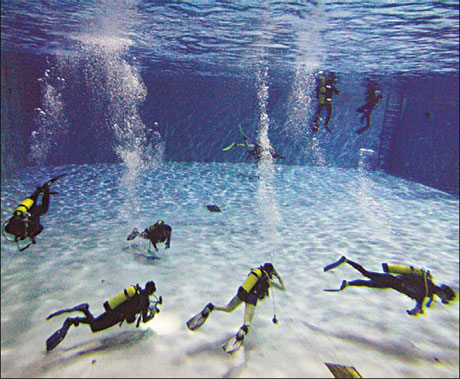Top Biz Photos
Clubs witness a wave of popularity
By Bao Chang (China Daily)
Updated: 2010-07-26 10:14
 |
Large Medium Small |
|
 |
|
People enjoying a dive in a seven-meter pool. It costs 400 yuan per dive and more than 4,000 yuan for a diving course that includes 21 one-hour classes. [Lu Haitao / China Foto Press] |
BEIJING -Jidu Diving Club, one of the largest diving clubs in Beijing, received its biggest business boost last week since it was established in 2003 when 86 people applied for firsthand experience of the sport in one day.
"It really surprised me that so many persons wanted to try it. We have only catered to a small group of people before," said the club's chief instructor, Zhang Xin.
According to Zhang, diving accounts for a large proportion the cost of Jidu fitness center, where there is also a swimming club and gymnasium. It found it difficult to balance its books because of the high cost of equipment and low number of customers.
"The diving club relied on income from the swimming club and gym before. However, unlike previous years, this summer we have seen an explosion in people's enthusiasm for the sport," he said.
Jidu provides firsthand experience and training in diving with an in-house 7-meter deep diving pool. It charges 400 yuan for one diving lesson and more than 4,000 yuan for a course of 21 one-hour classes.
Zhang said that most people who come for one session are young and it was their first taste of the sport. Those who buy the training course are mainly middle class. They seek a diving certificate so they can dive when they travel abroad.
| ||||
Two of Zhang's students were executives at big companies who have their own cruisers. After two months of training at the club, they went to Sanya to try the sport.
According to Wang Gang, president of Long Yuan Diving Club in Beijing, 80 percent of fans of the sport in China are people with salaries above 5,000 yuan a month. Of those, 50 percent are entrepreneurs and 40 percent are white-collar workers.
In addition to offering training, sales of diving equipment and leasing the premises for movie productions also contribute to the business of diving clubs. The rental for Jidu Diving Club is 10,000 yuan every eight hours.
To popularize the sport, diving clubs are employing different marketing strategies. Young women dressed as mermaids will act as trainers for customers at Long Yuan Diving Club. People can see thousands of fish while diving in Blue Zoo at Beijing Workers' Stadium.
At present, there are more than 20 dive training clubs in Beijing. Competition comes from abroad. In the Philippines and Thailand fees are often no more than 2,000 yuan, which is much lower than that of the domestic clubs. Some people go to these countries to take courses.
Chinese coaches in these countries are very popular because there are many Chinese tourists and so no language problem. Apart from the training, taking underwater photos and videos also contribute a lot of income to these clubs.



